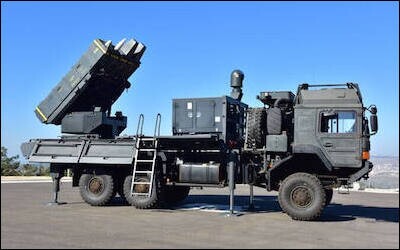Previous purchasers of Israel’s Spyder mobile air defense system include India and Singapore. |
The Czech Republic is emerging as one of Israel’s closest allies in Europe and a key defense connection for Jerusalem. On September 25, the Czech government and Israel’s Ministry of Defense announced that Prague is looking to acquire Israel’s Spyder air defense. Spyder batteries are made by Rafael Advanced Defense Systems, the maker of Iron Dome and one of Israel’s innovative defense companies.
Israeli Defense Minister Benny Gantz, who was holding meetings with U.S. Defense Secretary Mark Esper the same week, said that he thanked the Czech government for their partnership and decision to equip their military with the Israeli system. This is important for Israel, because Israel is both procuring the latest defense technology from the United States and also sees defense exports as a key to its economy and strategic posture. “This is another significant step in strengthening security relations between our two countries, and it is also great news for Israeli defense industries during such a complex period,” Gantz said.
The Czech Republic has been looking to upgrade its military over the last decades and also its radars and air defense. The Spyder system includes a radar system produced by Elta, a subsidiary of Israel Aerospace Industries (IAI). This means that Prague is increasingly plugged into Israel’s latest defense capabilities and innovations. It took years to get here, like any military procurement process. The Czech Ministry of Defense recently informed the Directorate of International Defense Cooperation (SIBAT) in the Israel’s Ministry of Defense of its decision to equip its military with Israeli air defense systems, according to a statement from Israel’s Ministry of Defense.
This is a government to government arrangement worth “hundreds of millions of dollars,” the Israelis say. It will include the surface-to-air missiles Python and Derby that are compatible with the Syder system. Spyder is usually a truck-mounted air defense. Rafael describes the system as a quick reaction, low-to-high surface-to-air missile system designed to counter attacks by a variety of aerial threats including aircraft, helicopters and drones. “The system provides effective protection of valuable assets, as well as first-class defense for maneuvering forces located in combat areas.”
Ariel Karo, executive vice-president of marketing and business development at Rafael said he was proud that his company was selected by the Czechs. It is “a significant vote of confidence in our proven air defense capabilities demonstrated over the years through a variety of solutions that span from Iron Dome, David’s Sling, and the Spyder air defense system, in service and combat-proven in different countries around the world.” David’s Sling and Iron Dome were both supported by America and the U.S. army has recently expressed interest in Iron Dome. U.S. Oshkosh trucks arrived in Israel in early August to be linked with the Iron Dome system.
The Czech Ministry of Defense said that the system will meet is needs for a short and medium range air defense system, usually abbreviated as SHORAD and MRSAM. Czech Republic Minister of Defense Lubomir Metner spoke with his Israeli counterparts about the deal in later September. He said that anti-aircraft systems and supersonic aircraft are pillars of modern air defense. Acquiring new generation anti-aircraft missiles capable of counter modern threats is key to the country’s strategic outlook. Several batteries of Spyder are expected to be acquired. It will relace an older air defense system called 2K12 Kub that was a Soviet-era design. This is vital since that old system dates from the 1960s. The Israeli system will arrive by 2023 according to reports. Czech industry will also benefit from the negotiations with support for logistics and integration.
It was the second European deal that Israel’s defense authorities announced in a week. On September 23, the Israeli and Italian defense ministries announced an exchange whereby Israel would buy twelve training helicopters and Italy would acquire more Spike LR2 anti-tank missiles. Again, Israel’s Minister of Defense Benny Gantz praised the deal and close work with Italy. This exchange was based on a previous exchange in 2011 when Israel acquired training aircraft and Italy received an observation satellite and two airborne early warning systems.
Israel will get new training helicopters from the defense giant Leonardo, which will replace older Bell 206 helicopters it has used since the 1970s. These AW119KX will be sent to Israel’s flight school. Meanwhile Italy will get Spike missile launchers and missiles, more than 100 of the launchers and 800 missiles. Director General of the Israel Ministry of Defense, Maj. Gen. (Res.) Amir Eshel said the agreement was “another expression of the close security and economic relations between Israel and Italy. It enables the IDF to complete the replacement of the old training aircraft in the IAF. In addition, the reciprocal procurement agreement which includes the purchase [of systems] from Israeli defense industries, positively affects Israel’s exports and economy.”
This is important because it comes amid the coronavirus pandemic when some defense purchases and high-level visits have been put on hold. Israel was about to enter a new national lockdown as the deals were being announced. Israel’s increased visibility in European defense is important because it showcases that the relatively small country is at the cutting edge of various technologies. For instance the Spike family of missiles is being used by roughly thirty militaries around the world and Rafael is increasing its investments in artificial intelligence and other technology that make weapons smarter and more precise. This in turn will give soldiers at the front access to more information that they need to make the weapons function at the highest level.
Seth Frantzman is a Ginsburg-Milstein Writing Fellow at the Middle East Forum and senior Middle East correspondent at The Jerusalem Post.







